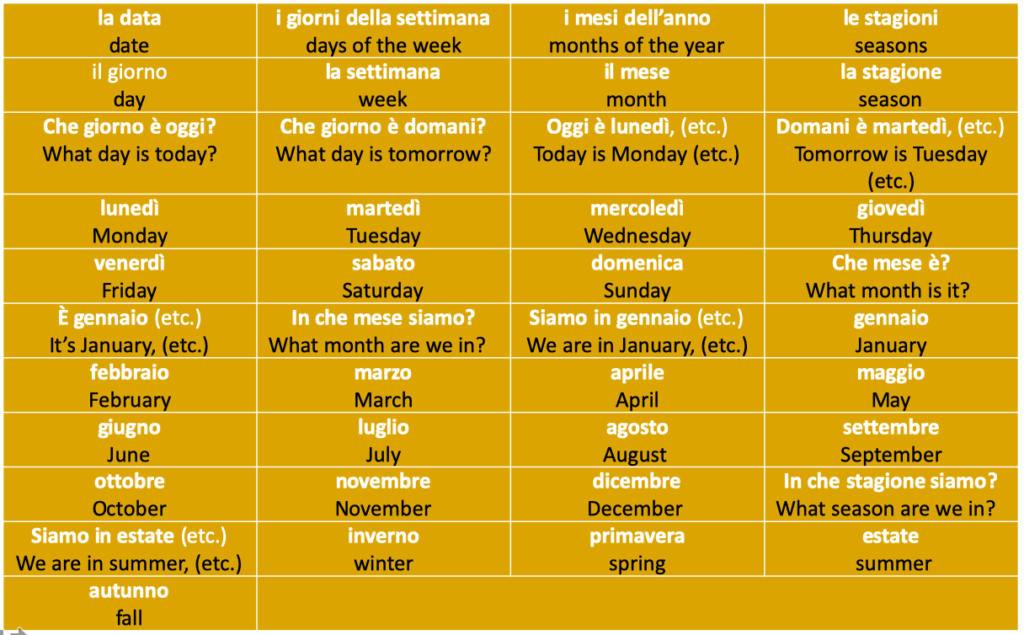What day is today?
| Listen to the audio file and find the corresponding images below.
Then click here for the answers.
|
| I giorni, i mesi, le stagioni
To practice vocabulary and pronunciation, use Quizlet. |
Che giorno è oggi? (What day is today?) Che giorno è domani? (What day is tomorrow?) are simple questions to ask about the date. You can answer with Oggi è…. (Today is…) Domani è…. (Tomorrow is…) + the day of the week or with a more complete expression.
The date is expressed in Italian according to the following pattern:
Il + number + (di) month + (del) year: Il 29 (di) marzo (del) 2019 (3/29/2019), Il 3 (di) aprile (del) 2016 (4/3/2016), etc. Note: (di) and (del) are optional: Il 29 marzo 2019 (3/29/2019), Il 3 aprile 2016 (4/3/2016), etc.
Unlike in English, to express days of the month, the cardinal numbers are used (due, tre, quattro……) except for the first of the month, which is indicated by the ordinal number primo (1st.): Oggi è il primo ottobre, domani è il due (Today is October first; tomorrow is the second).
If a day of the week is indicated, dates are expressed in Italian according to the following pattern: Day of the week + number + (di) month + (del) year: Oggi è venerdì 29 (di) marzo (del) 2013 (Today is Friday, October 29th, 2013). Note: (di) and (del) are optional
The days of the week (i giorni della settimana) in Italian are all masculine except for (la) domenica (Sunday) and they are never capitalized except, of course, at the beginning of a sentence.
The names of the months (i mesi) and the names of seasons (le stagioni) are not capitalized in Italian, except, of course, at the beginning of a sentence.
Note: When writing the date informally (in numeric form), Italians put the day first, then month and year while Americans place the month first. So January 8, 2019 is written as 8/1/19 and not 1/8/19.
Let’s see know how to express the day, month and season when one does something:
- With days of the week you can use the nouns alone (lunedì, martedì, etc.) or preceded by the definite article (il or la) when you want to indicate an habitual action. Note the difference between (WITHOUT ARTICLE) Domenica vado in palestra (This Sunday I go to the gym / I go to the gym this Sunday) and (WITH ARTICLE) La domenica vado in palestra (On Sundays I go to the gym / I go to the gym every Sunday).
- With months in and a in front of the noun are interchangeable: La scuola comincia a/in settembre (School begins in September)
- With seasons in is used in front of the nouns: In inverno andiamo a sciare (In winter we go skiing).;
Tasks
|
Practice
Previous > Verbi in -ere e -ire
Next > Le preposizioni

